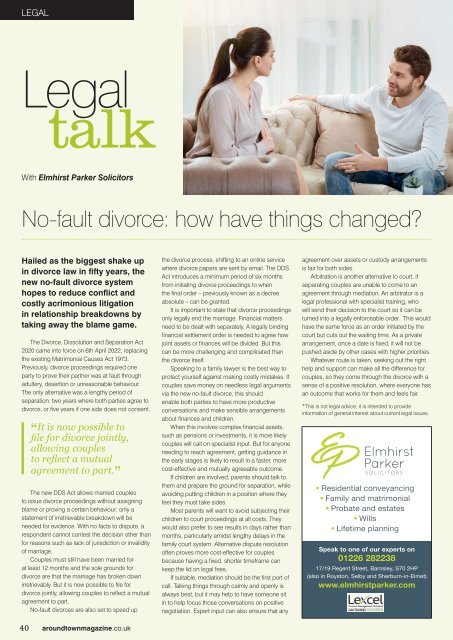Aroundtown Magazine May June 2022 Edition
The May June edition of South Yorkshire's FREE premier lifestyle magazine.
The May June edition of South Yorkshire's FREE premier lifestyle magazine.
Create successful ePaper yourself
Turn your PDF publications into a flip-book with our unique Google optimized e-Paper software.
LEGAL<br />
Legal<br />
talk<br />
With Elmhirst Parker Solicitors<br />
No-fault divorce: how have things changed?<br />
Hailed as the biggest shake up<br />
in divorce law in fifty years, the<br />
new no-fault divorce system<br />
hopes to reduce conflict and<br />
costly acrimonious litigation<br />
in relationship breakdowns by<br />
taking away the blame game.<br />
The Divorce, Dissolution and Separation Act<br />
2020 came into force on 6th April <strong>2022</strong>, replacing<br />
the existing Matrimonial Causes Act 1973.<br />
Previously, divorce proceedings required one<br />
party to prove their partner was at fault through<br />
adultery, desertion or unreasonable behaviour.<br />
The only alternative was a lengthy period of<br />
separation: two years where both parties agree to<br />
divorce, or five years if one side does not consent.<br />
“<br />
It is now possible to<br />
file for divorce jointly,<br />
allowing couples<br />
to reflect a mutual<br />
agreement to part.<br />
”<br />
The new DDS Act allows married couples<br />
to issue divorce proceedings without assigning<br />
blame or proving a certain behaviour; only a<br />
statement of irretrievable breakdown will be<br />
needed for evidence. With no facts to dispute, a<br />
respondent cannot contest the decision other than<br />
for reasons such as lack of jurisdiction or invalidity<br />
of marriage.<br />
Couples must still have been married for<br />
at least 12 months and the sole grounds for<br />
divorce are that the marriage has broken down<br />
irretrievably. But it is now possible to file for<br />
divorce jointly, allowing couples to reflect a mutual<br />
agreement to part.<br />
No-fault divorces are also set to speed up<br />
40 aroundtownmagazine.co.uk<br />
the divorce process, shifting to an online service<br />
where divorce papers are sent by email. The DDS<br />
Act introduces a minimum period of six months<br />
from initiating divorce proceedings to when<br />
the final order – previously known as a decree<br />
absolute – can be granted.<br />
It is important to state that divorce proceedings<br />
only legally end the marriage. Financial matters<br />
need to be dealt with separately. A legally binding<br />
financial settlement order is needed to agree how<br />
joint assets or finances will be divided. But this<br />
can be more challenging and complicated than<br />
the divorce itself.<br />
Speaking to a family lawyer is the best way to<br />
protect yourself against making costly mistakes. If<br />
couples save money on needless legal arguments<br />
via the new no-fault divorce, this should<br />
enable both parties to have more productive<br />
conversations and make sensible arrangements<br />
about finances and children.<br />
When this involves complex financial assets,<br />
such as pensions or investments, it is more likely<br />
couples will call on specialist input. But for anyone<br />
needing to reach agreement, getting guidance in<br />
the early stages is likely to result in a faster, more<br />
cost-effective and mutually agreeable outcome.<br />
If children are involved, parents should talk to<br />
them and prepare the ground for separation, while<br />
avoiding putting children in a position where they<br />
feel they must take sides.<br />
Most parents will want to avoid subjecting their<br />
children to court proceedings at all costs. They<br />
would also prefer to see results in days rather than<br />
months, particularly amidst lengthy delays in the<br />
family court system. Alternative dispute resolution<br />
often proves more cost-effective for couples<br />
because having a fixed, shorter timeframe can<br />
keep the lid on legal fees.<br />
If suitable, mediation should be the first port of<br />
call. Talking things through calmly and openly is<br />
always best, but it may help to have someone sit<br />
in to help focus those conversations on positive<br />
negotiation. Expert input can also ensure that any<br />
agreement over assets or custody arrangements<br />
is fair for both sides.<br />
Arbitration is another alternative to court, if<br />
separating couples are unable to come to an<br />
agreement through mediation. An arbitrator is a<br />
legal professional with specialist training, who<br />
will send their decision to the court so it can be<br />
turned into a legally enforceable order. This would<br />
have the same force as an order initiated by the<br />
court but cuts out the waiting time. As a private<br />
arrangement, once a date is fixed, it will not be<br />
pushed aside by other cases with higher priorities.<br />
Whatever route is taken, seeking out the right<br />
help and support can make all the difference for<br />
couples, so they come through the divorce with a<br />
sense of a positive resolution, where everyone has<br />
an outcome that works for them and feels fair.<br />
*This is not legal advice; it is intended to provide<br />
information of general interest about current legal issues.<br />
• Residential conveyancing<br />
• Family and matrimonial<br />
• Probate and estates<br />
• Wills<br />
• Lifetime planning<br />
Speak to one of our experts on<br />
01226 282238<br />
17/19 Regent Street, Barnsley, S70 2HP<br />
(also in Royston, Selby and Sherburn-in-Elmet)<br />
www.elmhirstparker.com
















